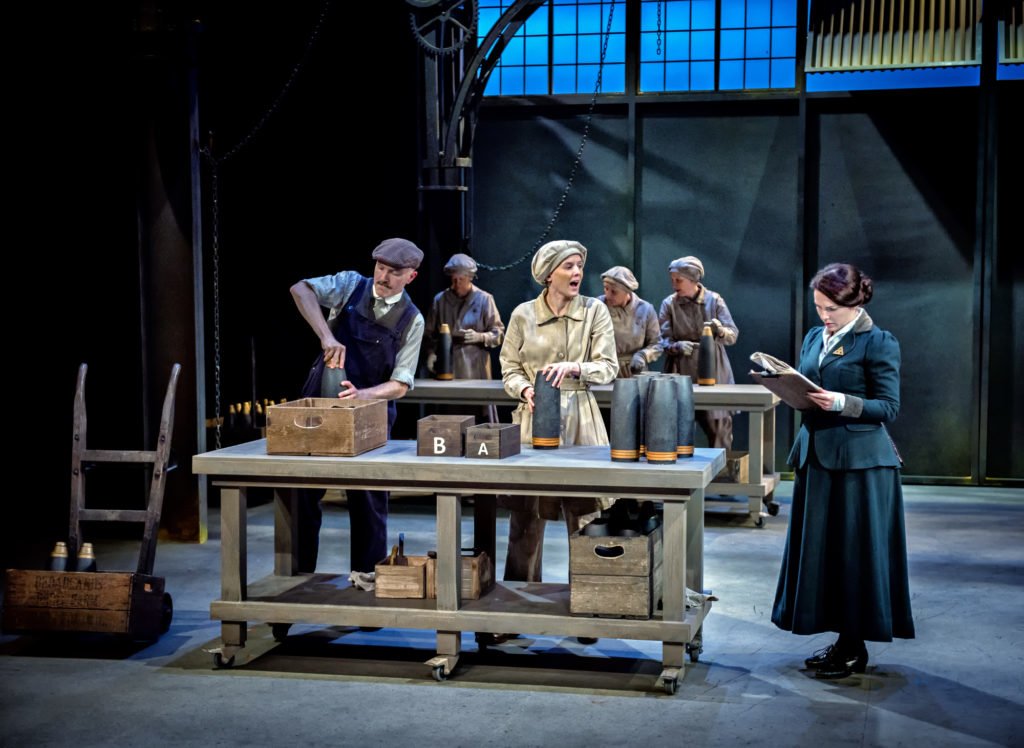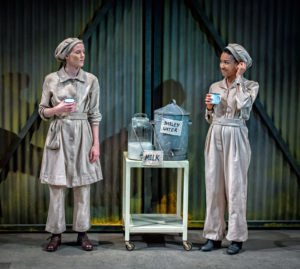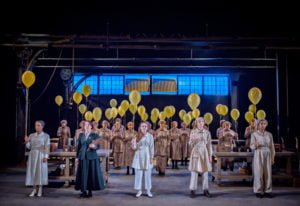Review: The Barnbow Canaries @ the West Yorkshire Playhouse
June 27, 2016

Dominic Gatley, Colette O’Rourke & Kristin Atherton in Barnbow Canaries. Photography by Anthony Robling
The Barnbow Canaries is about the women that the war forgot: an emotional new play about the Leeds munitions workers of the First World War.
On a cold December day in 1916, several hundred women filed into Barnbow munitions factory in Leeds. They were eager to support the men on the front line and, at £3 per week, they were earning considerably more than most other working women. At 10.30 that morning an explosion ripped through building, instantly killing 35 women, the greatest loss of female life in WW1. It’s the single greatest loss of human life in Leeds’ history, yet their story has remained untold until now.
Alice Nutter’s new play The Barnbow Canaries tells a fictionalised account of this event, using the names of real women who died in the blast. At the centre of the story are sisters Agnes and Edith, two Yorkshire lasses fighting different battles. Agnes is a fierce worker and a self-proclaimed ‘one woman band’, battling the injustice of the lower female wages compared to their male counterparts. Her younger sister Edith is dreamier yet sharper and can see the longer-lasting damage of their work. The relationship between these strong-headed sisters guides us towards the inevitable tragedy.

Colette O’Rourke and Jade Ogugua in Barnbow Canaries. Photography by Anthony Robling
Nutter’s script does an excellent job of revealing the women’s dire situation without it ever feeling like a history lesson. And the situation is indeed heartbreaking: the higher wage was an underhanded means to entice women into work that would eventually kill them. TNT gradually poisoned the women, turning them yellow, hence the nickname ‘the Barnbow canaries’. What’s impressive is how much humour shines through the sad story, a testament to Nutter’s keen characterisation. By sharing a few laughs with these women, the tragedy is felt all the more keenly.
It’s a shame then that the second act doesn’t have the same narrative power. It feels less like a continuation of the story and more like a bullet-point epilogue, quickly detailing the end of the war and its ramifications on the women on the home front. A ghostly plot device is only semi-effective and a final tribute to the women adds surprisingly little to the poignancy. Yellow balloons may seem appropriate considering the play’s title, but their brightness jars against the play’s grimy aesthetic.

Barnow Canaries Photography by Anthony Robling
All other aspects of the production design are both industrial and slick, with an audacious amount of set changes and background characters. Director Kate Wasserberg and designer Mark Bailey utilise large sliding metal doors to take us out of the factory – to dance halls and even the front line – without losing the grimy sense that you can almost taste the TNT. The explosive centrepiece is expertly handled, both epic and harrowing, a show-stopping set-piece worthy of the West End.
This is a story for the people of Leeds and will undoubtedly find its greatest success with local audiences. Mentions of Hunslet and Holbeck create chuckles of familiarity, but hopefully this play will reach a wider audience. It’s not without its patchy moments – the production veers unnaturally into musical territory at one point – but Alice Nutter’s script highlights a forgotten moment of history with rawness and sensitivity. The Barnbow lasses have a story worth telling and this is a fitting tribute to their contribution in the Great War.
The Barnbow Canaries will be playing at the West Yorkshire Playhouse until 9 July.
Filed under: Theatre & Dance
Tagged with: Alice Nutter, First World War, Leeds. theatre, The Barnbow Canaries, West Yorkshire Playhouse



Comments